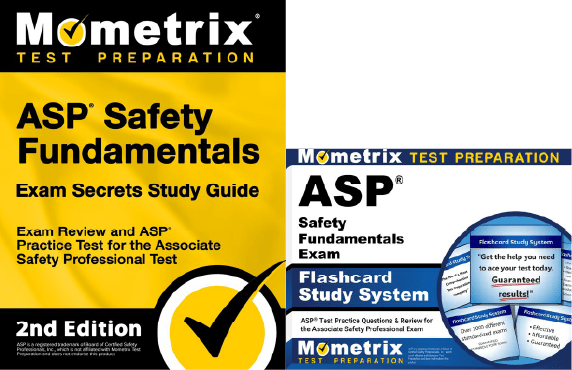If you need help studying for the Certified Safety Professional (ASP®) exam or just want some more information about what the exam is like, you’ve come to the right place.
Click below to take a free ASP practice test!
ASP Exam Eligibility
Before you can begin the registration process, you’ll need to have at least a bachelor’s degree, and you’ll need at least one year of safety experience.
Once you meet those requirements, you’re all set to start the registration process!
What’s on the Exam?
First, let’s talk about the questions on the exam. There are 200 multiple-choice questions total, but only 176 of the questions will count toward your score. Why is that?
The 24 unscored questions on the ASP exam are called “beta” questions. These are added to the exam to determine if they’re good enough questions to add to future versions of the test.
The trick is that you won’t have any way of knowing which questions are scored and which ones are beta. They will appear just like the scored questions throughout the test.
The time limit for the exam is 5 hours. There aren’t any scheduled breaks, but you’re free to take restroom breaks as needed.
Let’s take a closer look at the different sections of the ASPexam.
1. Mathematical Calculations
10% of the exam
- Convert between units
- Carry out fundamental physics calculations
- Determine flow rates
- Compute rigging and load requirements
- Determine safe manual-lifting parameters
- Assess exposure levels
- Estimate radiation dose
- Evaluate noise hazard levels
- Quantify climate and environmental conditions
- Compute storage capacity
- Calculate financial performance indicators
- Calculate lagging safety indicators
- Estimate probability of failure modes
2. Safety Programs and Concepts
25% of the exam
- Core safety fundamentals across processes
- The hierarchy of hazard controls
- Methods for hazard and risk analysis
- Using risk matrices for ranking and mitigation
- Leading and lagging indicators
- Incident investigation practices
- Change-management concepts
- Safety management systems for program development
- Basic electrical safety principles
- Emerging EHS technologies
3. Ergonomics
8% of the exam
- Ergonomic principles for workstation design and manual material handling
- Common ergonomic risk factors
- Qualitative and quantitative ergonomic assessment methods
- Ergonomic work-practice controls
- Work-related musculoskeletal injuries
- Components of an ergonomics program
4. Fire Prevention and Protection
12% of the exam
- Basics of fire science
- Properties of flammable and combustible materials
- Hazards associated with combustible dust
- Risks during hot-work operations
- Electrical fire hazards and controls
- Fire detection and suppression systems
- Fire extinguisher types, applications, and requirements
- Segregation and separation practices
- Housekeeping practices that reduce fire risk
- Fire-prevention signs and labels
5. Emergency Preparedness and Response
10% of the exam
- Risks from natural, human-caused, and biological emergencies
- Core elements of emergency preparedness
- Components of an emergency response plan
- Elements of disaster response and recovery
- Essentials of a workplace-violence prevention program
- Safety considerations for lone workers
6. Industrial Hygiene and Occupational Health
12% of the exam
- Fundamentals of industrial hygiene programs
- Types of occupational exposure limits
- Acute versus chronic exposures
- Routes of entry for hazardous substances
- Relevant human anatomy and physiology for occupational exposures
- Basics of ionizing radiation
- Foundational chemistry concepts
- Universal precautions for pathogen control
- Fitness-for-duty and return-to-work requirements
- Key aspects of Total Worker Health
7. Environmental Management
7% of the exam
- EMS standards for program development
- Environmental hazards, impacts, and best practices
- The conservation hierarchy
- Waste classification, labeling, treatment, certification, and disposal
- The EHS role within ESG
8. Training, Education, and Communication
11% of the exam
- Learning theories and techniques
- Appropriate training tools
- Data collection, needs and gap analyses, and feedback
- Baseline competency expectations
- Requirements for competent and qualified persons
- Human risk factors that affect performance
- Building a positive safety culture
9. Legal
5% of the exam
- Contract terminology and the contract-management lifecycle
- Principles of risk transfer
- Legal liability in contractor management and multi-employer worksites
- Compliance requirements and legal liability for safety-professional practice
- Liability issues related to worker impairment
- Appropriate actions given knowledge and scope limitations
How to Register
To get started with the registration process, you’ll need to submit an application via the BCSP website. This application includes a $160 application fee.
Once your application is approved, you’ll be given the necessary information to register for the exam.
Online ASP Prep Course
If you want to be fully prepared, Mometrix offers an online ASP Prep Course. The course is designed to provide you with any and every resource you might want while studying. The ASP Course includes:
The ASP Prep Course is designed to help any learner get everything they need to prepare for their ASP exam. Click below to check it out!
Exam Scores
The exam is scored using two methods: the modified Angoff method and the bookmark standard setting method.
This method relies on a group of subject matter experts to evaluate each question on the exam and determine its overall difficulty. Once a rating is agreed upon for each question, they establish a cut score, which indicates how many questions you need to answer correctly to be at the minimum level of competency.
Bookmark Standard Setting Method
This method relies on a group of subject matter experts to evaluate each question on the exam one at a time. The goal is to find a single question that represents the minimum level of knowledge/ability required to be a competent ASP (in some cases, they may decide there are multiple “bookmark” questions).
Retaking the Exam
If you didn’t get a passing score on your first try, that’s okay! You can retake the test as many times as you’d like. Just note that there’s a mandatory six-week waiting period between attempts.
FAQs
How hard is the ASP exam?
It’s a pretty difficult exam, with the current pass rate being about 50%.
How many questions are on the ASP exam?
The exam contains 200 questions,.
What is the time limit for the ASP exam?
The exam is timed at 5 hours.
What is the passing score for the ASP exam?
You’ll need to answer at least 61% of the questions correctly to pass the exam.
How much does the ASP exam cost?
The testing fee is $350.
ASP is a registered trademark of Board of Certified Safety Professionals, Inc., which is not affiliated with Mometrix Test Preparation and does not endorse the information on this page.



 ASP Online Course
ASP Online Course ASP Study Guide
ASP Study Guide ASP Flashcards
ASP Flashcards

